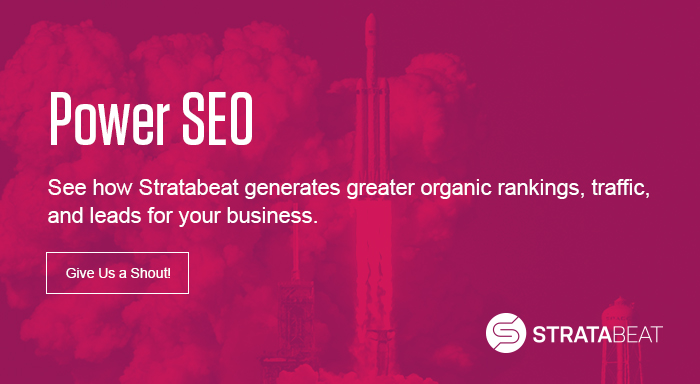The Neuroscience of SEO

I just spent the past few days at Pubcon in Las Vegas, with speakers including Gary Illyes at Google and Scott Monty, the former global social media lead at Ford Motor Company. On Wednesday it was my turn, as I joined Roger Dooley on stage to explore “The Neuroscience of SEO”.
In our session, Dooley, author of the books Brainfluence and The Persuasion Slide, covered key concepts of neuromarketing, as well as its relevance to external linking, content, and sharing.
My talk focused squarely on the search engine results page (SERP), exploring how neuromarketing principles can increase the click-through rate (CTR) of organic search results. With every 3% increase in CTR of your organic listing in the SERP, your listing improves by an average of one position on the page. Considering that many searches include 10 or so organic results on the page, we’re talking about a 10% increase in positioning with every incremental shift, which is significant.
Adding weight to the value of focusing on CTR of your search results in your SEO efforts is Google RankBrain. Greg Corrado, a senior research scientist at Google, stated publicly last year that RankBrain is the third most important signal contributing to the result of a search. With Google’s intense focus on AI now, this influence will only increase moving forward. One of the repercussions of this is that engagement metrics are going to be a larger factor in search rankings, with CTR a core such metric.
With all of this in mind, here are three key methods for you to increase the CTR of your organic listings in the search engine results page:
1. Deviation & Surprise
With so many companies employing SEO best practices, the SERPs are now filled with similar, me-too listings. Depending on the search, differentiation is hard to find in the SERPs. For example, a search for “flights to Chicago” produces organic result after organic result speaking to “cheap flights to Chicago”. In fact, when I make this search now, nine of the top 10 organic results are all based on the theme of “cheap flights”.
Let’s face it. We’re drowning in a sea of sameness! This just isn’t good marketing, and is certainly not compelling to a prospective customer.
According to Susan Weinschenk, the human mind wanders 30% of the time. With information overload a very real problem, our brains strive to shut out information to help us function effectively without being overwhelmed.
How can you break through and be noticed in this sea of sameness and this world of information overload?
The answer is deviation and surprise. In fact, the neuroscientist Gregory Berns and a team of scientists from Emory University and Baylor University found that the human brain physically lights up when surprised. People actually enjoy surprise more than they enjoy things that they like. This is a powerful insight. It’s not uncommon for SEOs to focus on keywords and topics. How often do you hear them discussing the importance of deviation and surprise – in other words, marketing that cuts through the noise and grabs your attention.
Proving the point of the power of deviation and surprise in your marketing is Blendtec, which shocked the market when it started blending everyday products to demonstrate the power of its blenders – grinding everything from golf balls to diamonds, rake handles to 2x4s, and iPhones to iPads. The Blendtec series of videos has earned more than 50,000,000 views.
2. Emotions
Beyond deviation and surprise, you can inject emotion into your SERP listings to stand out, engage your audience, and increase your CTR. Why is emotion so powerful in driving you to action?
Consider the studies of neuroscientist Antonio Damasio, who examined people with damage to the part of the brain that triggers emotions. Although functioning members of society, these people couldn’t feel emotions. And what Damasio found was that they consequently found it extremely difficult to make any decisions (including the decision to purchase from you, engage with you, contact you, attend your event, download your trial, etc.), as they couldn’t feel strongly enough about one option vs. another.
In other words, if your messaging is not evoking an emotional response, your marketing itself is what’s making it very difficult for your target audience to respond positively to your SERP listings and to click through. That’s right – it’s not necessarily the competition, but is instead your own marketing that’s presenting the obstacles to a click-through or purchase.
https://www.youtube.com/watch?v=XjJQBjWYDTs
Some of the most successful marketers in the country have known this for years. Take Always, with its #LikeAGirl campaign. The first video has been viewed over 62,000,000 times. The accompanying behind-the-scenes video boasts over 30,000,000 views. The follow-up “Unstoppable” video over 38,000,000. All told, the entire video series has over 150,000,000 video views, and countless press mentions. What’s interesting is that the videos don’t even mention what Always is selling. Instead, the marketing focuses on evoking an emotional response.
The power of emotional marketing has been utilized in the growth of many market leaders, such as Nike, Apple, Red Bull, Google, Autodesk, GE, T-Mobile, and others.
3. Social Proof
Robert Cialdini wrote the best-selling book Influence – The Psychology of Persuasion. In it, he points to the power of social-proof as a key “weapon of influence” in the persuasion of others.
https://www.youtube.com/watch?v=njf3qPR1Vvc
In the SERPs, you can see examples here and there of social proof helping to increase CTR for smart marketers. Salesforce, the fastest enterprise software company to hit $5 billion in annual revenue, clearly knows a thing or two about effective marketing. They are a good example of a company that uses social proof to their advantage in the SERPs. Search for customer relationship management software, and the Salesforce listing speaks to the more than 100,000 companies that use its software (“Join 100000+ businesses using salesforce.
If you look at Axure, a digital prototyping and wireframing software company, the organic SERP listing points out that 86% of the Fortune 100 use its software. The SERP description language of Articulate, an e-learning software company, includes stats related to its popularity as well, speaking to its client list of 93 of the Fortune 100 and 19 of the top 20 universities.
***
SEOs are often focused on keywords. But keywords are only part of the equation. With Google RankBrain giving ever-increasing importance to CTR in the SERPS, it behooves you to start focusing on driving higher CTR of your organic search listings through more effectively crafted Titles, Meta Descriptions, and URLs. Deviation/surprise, emotional marketing, and social proof are three highly effective ways to start raising your CTR today.
